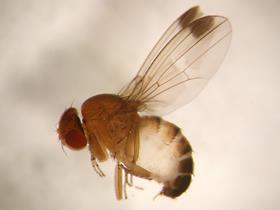
The UK horticulture sector is funding a major new research project to combat the threat from the Asian fruit fly.
The 'crucial' research will help expand knowledge and understanding of how to manage Spotted Wing Drosophila (SWD), a non-native fruit fly species from Asia.
The programme is funded jointly by DEFRA and the industry through four organisations: British Summer Fruits, East Malling Trust for Horticultural Research, Horticulture Development Company and the Worshipful Company of Fruiterers.
Professor Jerry Cross at East Malling Research (EMR) is leading the research. He aims to increase understanding of SWD biology under UK conditions in order to equip growers with the knowledge they need to manage the pest most effectively.
Laurence Olins, chairman of British Summer Fruits, which represents growers and suppliers of some 85 per cent of berries sold in UK supermarkets, said: “This new research project and additional entomologist resource at EMR will be critical in furthering our knowledge of this fly. A great deal of insight has already been gathered by the cross-industry group from other countries’ experiences of managing SWD, but in addition to providing growers with practical advice and support we need to get a long-term understanding of its specific behaviour in the UK.”
To support the research, EMR recently appointed Dr David Buss who was previously a scientist at the University of Reading. In addition, before the season started, both EMR and the James Hutton Institute (with funding from the Scottish government) deployed traps on farms across England and Scotland. Traps have been placed in all the main soft and stone fruit crops, especially crops grown in polytunnels, and also in potential wild habitats. Contents from the traps are being sent to EMR and the James Hutton Institute every week for analysis and identification. So far no SWD has been caught in the UK in 2013.
In addition to the research traps - following the recommendations given as part of the Spot It, Stop It Awareness campaign - many other growers and advisers have also placed SWD traps in their soft and stone fruit crops and are sending in their trap cards to EMR and the James Hutton Institute for analysis. None of these has been found to contain SWD either, but scientists are asking growers to avoid complacency with the recet change to warmer weather.
Cross said: “To date no Spotted Wing Drosophila has been identified in the samples sent to East Malling for identification. No doubt the very cold spring has meant that populations of the fly are yet to start to build to detectable levels.
“However, given the fly’s ability to over-winter in small numbers and the first record of the fly in the south of England last year, the industry does expect the fly to reappear and we are strongly recommending that growers and technical teams continue monitoring, trapping and good hygiene practices to minimise the impact on crops when populations of the fly do start to build up.”
As part of this safeguarding work, the cross industry-government working group made up of British Summer Fruits, HDC, the Food & Environment Research Agency (FERA), East Malling Research, the National Farmers Union, the Scottish government, the Chemical Regulation Directorate (CRD), the Tomato Growers Association and the UK Vines Association has been working together since May 2012. They launched the Spot It Stop It grower awareness campaign in February this year to provide practical, best practice advice on early-crop monitoring, hygiene, control and waste disposal.



